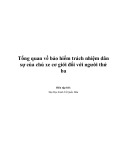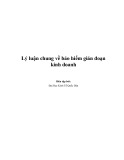
55
Journal of Development and Integration, No. 79 (2024)
No. 79 (2024) 55-62 I jdi.uef.edu.vn
K E Y W O R D S A B S T R A C T
Insurable Interest,
Law on Insurance
Business,
Life and Health
Insurance,
Personal Insurance
Contract.
The principle of insurable interest has existed for a long time in countries with developed
insurance markets. In many countries, it has been introduced in legal regulations that
can regulate it entirely and strictly. In Vietnam, no law regulated it until the first Law
on the Insurance Business of Vietnam was passed by the National Assembly in 2000,
and recently, it was replaced by the new Law 2022. Thus, it is not easily accessible in
Vietnam, especially for insurance customers in the context of changes when applying
the new Law. In the article, the author employs a qualitative research methodology
that collects and synthesizes secondary data from published articles and provisions in
Vietnam’s legal framework to review the literature on insurable interest, which includes
analyzing historical developments and legal frameworks in various jurisdictions, such as
the UK, USA, and China, to provide context to the principle’s evolution and application
in Vietnam. The article systematically examines the provisions of the Law on Insurance
Business in Vietnam (both the 2000 and the 2022 versions), specifically focusing on the
provisions regulating the principle of insurable interest. The author identifies shortcomings
in the earlier legislation and discusses amendments introduced in the new Law. This legal
analysis is crucial for understanding how Vietnam defines and regulates insurable interest
in the personal insurance contract. The article forecasts potential opportunities and risks
associated with implementing the new Law on Insurance Business 2022 provisions
concerning insurable interest. It also discusses policy implications to ensure the stable
development of Vietnam’s insurance market.
* Corresponding author. Email: nguyentienhung@ueh.edu.vn
https://doi.org/10.61602/jdi.2024.79.07
Received: 14-Sep-24; Revised: 19-Oct-24; Accepted: 22-Oct-24; Online: 08-Nov-24
ISSN (print): 1859-428X, ISSN (online): 2815-6234
Nguyen Tien Hung*
University of Economics Ho Chi Minh City, Vietnam
The principle of “insurable interest”
for personal insurance contracts in Vietnam
1. Introduction
The doctrine of insurable interest has existed for
a long time in countries with developed insurance
markets, such as the UK and the US. The principle
of insurable interest has become one of the essential
principles for concluding and implementing insurance
contracts. Therefore, any country wishes to introduce
legal regulations that can regulate it entirely and
strictly (Jing, 2014).

56 Journal of Development and Integration, No. 79 (2024)
Initially, the principle of insurable interest
appeared in Vietnam through the use of international
insurance terms and conditions by insurance
companies (mainly in marine insurance). No law
was regulating it until the first Law on the Insurance
Business of Vietnam was passed by the National
Assembly in 2000 (Office of the National Assembly
of Vietnam, 2019). For more than 20 years, this law
has contributed positively to the development of the
Vietnamese insurance market, with a turnover of
more than VND 200 trillion by the end of 2023, of
which more than 2/3 was revenue from life and health
insurance (Ngoc Cham, 2024). However, there are
many shortcomings, among which are shortcomings
and unreasonable regulations on insurable interest,
especially for personal insurance contracts. On June
16, 2022, the National Assembly of Vietnam passed
the new Law on Insurance Business, effective January
1, 2023 (Government E-newspaper, 2022). This
2022 law will significantly change the 2000 Law on
Insurance Business and will significantly impact the
development of the Vietnamese insurance market.
One of the significant changes is the change in the
provisions on the principle of insurable interest.
This doctrine is not easily accessible in Vietnam,
especially for insurance customers. Moreover, in the
context of changes when applying the new 2022 law,
the difficulty of application is increased. Meanwhile,
there is almost a lack of government guidance and
research articles on this issue. In this article, the
author wishes to summarize the theory of insurable
interest, including the origin, concept, and perspective
of developed insurance markets. The article will
also present the provisions of the Law on Insurance
Business of Vietnam on the principle of insurable
interest, analyze the shortcomings of the Law on
Insurance Business 2000, identify amendments
and supplements to the Law on Insurance Business
2022, and forecast its opportunities and risks. The
author collects and synthesizes data from published
international articles to achieve the above objectives
and synthesizes and analyzes the provisions on the
research subject of the two versions (2000 & 2022) of
the Law on Insurance Business of Vietnam, therefore,
proposes policy implications to ensure the stable
development of Vietnam’s insurance market.
The structure of this research article includes
the following parts: (1) Theoretical framework; (2)
Research methodology; (3) Research results and
discussion; (4) Conclusions.
2. Theoretical framework
2.1. History of the principle of Insurable Interest
For a long time, Insurable Interest has been
considered a fundamental principle when concluding
and implementing insurance contracts. The nature
and content of the “insurable interest” principle can
vary more or less depending on each country, from
one jurisdiction to another. However, the primary
reason for its emergence and existence is the same:
to prevent gambling and betting under the name
of insurance contracts and, at the same time, to
minimize the risk of harm to the insured object for
which a person proposes to purchase an insurance
policy (Jing, 2014).
2.1.1. England
In the UK, the Marine Insurance Act of 1745
invalidated insurance policies taken out on marine
cargo if the person taking out the insurance had
no pecuniary interest in the goods. The English
Parliament came to require an insurable interest
because it was found that the making Assurances
without further Proof of Interest than the Policy,
hath been productive of many pernicious practices,
whereby great numbers of ships with their cargoes,
have been fraudulently lost and destroyed (Sharo
Michael Atmeh, 2011). Legal regulation on marine
insurable interest were also strengthened with the
passing of the Marine Insurance Acts of 1906. The
1906 Act defined someone as having an interest in
a marine adventure when: “he stands in any legal
or equitable relation to the adventure or to any
insurable property at risk therein, in consequence of
which he may benefit by the safety or due arrival of
insurable property, or may be prejudiced by its loss,
or by damage thereto, or by the detention thereof,
or may incur liability in respect thereof” (National
Archives (Ed.)). The 1906 Act also extended the
penalties for taking out a marine insurance policy
without an insurable interest and made such action
a criminal offense, punishable by a fine or prison
for up to six months. 30 years after establishing the
principle of the insurable interest for property, the
regulation was extended to life insurance contracts
with the Life Assurance Act of 1774. The locus of the
1774 enactment was not necessarily a concern about
hastening the death of these individuals, but rather
Nguyen Tien Hung

57
Journal of Development and Integration, No. 79 (2024)
about gambling on a morally prohibited subject.
Parliament seemed to have placed another limitation
on the writing of insurance policies at the time by
stating that “no greater sum shall be recovered or
received from the insurer than the amount of value of
the interest of the insured in such life or lives, or other
event or events” (Sharo Michael Atmeh, 2011).
2.1.2. The United States
In USA, the earliest reference to the problem
concerning insurable interest occurred in the
property context in 1803 in Pritchet v. Insurance Co.
of North America (Sharo Michael Atmeh, 2011). The
Pritchet court stated that insurance is a contract of
indemnity. Its object is not to make a positive gain
but to avert a possible loss. A man can never be said
to be indemnified against a loss that can never happen
to him. The Judge pegged the idea of an insurable
interest to an actual loss being wrought to a person
claiming proceeds under an insurance contract.
Thus, the actual loss motive in this American judge’s
mind seems to differ from the anti-gambling motives
envisaged by the British Parliament’s version of an
insurable interest. Several decades after that, the
principle of insurable interest in life insurance was
developed on highly fact-based grounds, and the issue
wound itself into the Supreme Court. That is found
in Warnock v. Davis. In Warnock, the Supreme Court
stated that in all life insurance cases, there must be a
reasonable ground, founded upon the relations of the
parties to each other, either pecuniary or of blood or
affinity, to expect some benefit or advantage from the
continuance of the life of the assured (US Supreme
Court, 1881). The Court went on to resuscitate the
wagering concerns from the British system as the
reason underpinning insurable interest law in America
by stating that without an insurable interest, a contract
is a mere wager. Finally, the court extended the
insurable interest doctrine one step further by stating
that the assignment of a policy to a party not having
an insurable interest is as objectionable as the taking
out of a policy in his name. That person stands in the
position of one holding an invalid wager policy.
2.1.3. China
The doctrine of insurable interest in life insurance
in China is governed by arts 12, 31, 33, 34, and 53
of the Insurance Law 2002. Article 12 provides a
general definition of the concept of insurable interest
(applying to both property and life insurance), which
states, “Insurable interest shall refer to a legally
recognized interest of the proposer in the subject
matter of insurance” (National People’s Congress of
China, 2002). This definition establishes a narrow
and restrictive test of insurable interest—”a legally
recognized interest.” This is similar to the current
English law position, under which the policyholder
must show that his insurable interest in the life insured
is legally recognized. This strict test has caused
uncertainty and unfairness. In judicial practice, courts
look for a legally recognized interest. This can be seen
in the case of Mr Gao v Life Insurance Co. Mr Gao
adopted an abandoned baby girl. He registered the
adoption at the police station but did not register it with
a civil affairs department, which must be done for a
lawful adoption according to the Adoption Law. Gao
took out an accident policy on his adopted daughter,
who drowned a year later. He claimed, but his claim
was rejected by the insurer, who argued that Gao did
not have an insurable interest in his adopted daughter
because he did not register the adoption according to
the Law of Adoption. Thus, their relationship was not
legally recognized. This is certainly unfair and harsh
to the policyholder. It is submitted that the strict test
of “a legally recognized interest” needs reform (Jing,
2014). Article 53 of the Insurance Law 2002 is the
major article regarding insurable interest. It provides:
A proposer shall have an insurable interest in the
following persons:
(1) Himself;
(2) His spouse, children, and parents; and
(3) Apart from the above-mentioned, other family
members and close relatives bearing foster or support
or maintenance relationship with the proposer;
(4) A worker who has a working relationship with
the proposer.
In addition to the persons mentioned in the
preceding paragraphs, the proposer shall be deemed
to have an insurable interest in any insured person
who agrees that the proposer may conclude a contract
on his life (National People’s Congress of China,
2002).
It is clear that sub-arts (1), (2) and (3) concern
family relationships and sub-art (4) concerns an
employment relationship. The second paragraph
of art. 53 is about insurable interest in others who
are not included in the list and whose consent to the
proposer to insure their lives is sufficient for creating
Nguyen Tien Hung

58 Journal of Development and Integration, No. 79 (2024)
an insurable interest. Thus, art. 53 establishes three
categories of insurable interest: (1) Interest arising
out of family relationships, (2) Interest arising out of
an employment relationship, and (3) interest arising
out of the consent of the life to be insured.
2.2. Insurable Interest
“Insurable Interest” is a fundamental legal
concept in insurance law that refers to the financial
or other interest a person has in the subject matter of
an insurance contract. In other words, it is the interest
a person has in a property or a life (life, health, etc.)
that is being proposed to be insured (Dung NT.,
2020). Essentially, the principle of insurable interest
operates as a defense used by the insurer to estop
insured individuals who lack an interest in the person
or object insured from collecting on insurance policies
after an insured event happens (Sharo Michael Atmeh,
2011; Jing, 2014). There is a clear difference in the
identification of insurable interests in two types of
insurance contracts: Property and casualty insurance
(called “indemnity” contracts) and life insurance
(“non-indemnity” contracts) (Sharo Michael Atmeh,
2011). An insurable interest of a person in property
arises from his ownership or use of that property in
respect of which he has a financial interest or may
incur financial loss or legal liability. For a human
subject, a person has the right to insure his own life
(including life, health, etc.) or those of his relations,
whether pecuniary (in credit, labor, etc.) or of blood
or affinity, to expect some benefit or advantage from
the continuation of the insured’s life (Dung NT.,
2020).
3. Research methods
In the article, the author employs a qualitative
research methodology that collects and synthesizes
secondary data from published international articles
and provisions in Vietnam’s legal framework. This
approach aims to summarize theoretical frameworks,
historical perspectives, and legal requirements related
to insurable interest, particularly within the context
of Vietnam’s evolving insurance laws.
First, the author reviews existing literature
on insurable interest, drawing from international
sources to provide a comprehensive background.
The author utilizes published international articles to
gather insights into the theory of insurable interest,
its historical evolution, and its application in different
legal contexts, such as the UK, USA, and China.
Second, the article analyses specific provisions
related to insurable interest in personal insurance
contracts from the 2000 Vietnam Law on Insurance
Business. A detailed examination of legal texts from
Vietnam’s insurance laws provides empirical data
for assessing the effectiveness and clarity of current
regulations surrounding insurable interests, highlights
shortcomings, and identifies necessary reforms. Next,
the author presents amendments introduced in the
2022 law compared to the 2000 law and identifies
opportunities and risks associated with these
changes in legislation. Finally, the analysis includes
a discussion of practical implications for insurance
customers in light of recent legislative changes.
This systematic approach allows for a nuanced
exploration of insurable interest, aiming to inform
legal practitioners and policymakers about potential
improvements needed in Vietnam’s insurance
regulatory framework.
4. Results and Discussion
4.1. Principle of Insurable Interests in Vietnam’s
Law on Insurance Business 2000
The principle of insurable interest in personal
insurance in Vietnam is governed by Articles 3, 22,
23, and 31 of the Law on Insurance Business 2000
(Office of the National Assembly of Vietnam, 2019).
- Article 3 includes the content of the explanation
of terms and clause 9 of this article provides the
general definition of insurable interest: “Insurable
interests are the right and obligation of custody and
alimony for the insured object.”
- Clause 2 of Article 31 stipulates whom a person
can propose to purchase an insurance policy for their
life and health:
“The proposer may only purchase insurance for
the following persons:
a) The policyholder himself/herself;
b) The policyholder’s spouse, children, and
parents;
c) Siblings; persons in a custody or of custody and
alimony relationship;
d) Other persons, if the policyholder has an
insurable interest.”
- Article 22 stipulates cases where insurance
contracts are invalid, in which Clause 1, Point (a)
Nguyen Tien Hung

59
Journal of Development and Integration, No. 79 (2024)
states: An insurance contract is invalid when the
insurance buyer does not have insurable interest;
- Articles 23 and 24 stipulate the termination of
an insurance contract and its legal consequences.
Accordingly, Clause 1, Article 23 and Clause 1,
Article 24 stipulate that an insurance contract
terminates when “... The policyholder no longer
has insurable interests.” In this case, “the insurance
enterprise must refund the insurance premium to the
policyholder corresponding to the remaining period
of the insurance contract for which the policyholder
has paid the insurance premium, after deducting
reasonable expenses related to the insurance
contract.”
4.2. The problem of the legal regulations on the
Principle of Insurable Interests in the Law on
Insurance Business 2000
First of all, the definition of Insurable Interest
for the personal object as “the right and obligation
of custody and alimony for the insured” shows the
following shortcomings:
- It does not include the most basic case of human
insurance, which is when a person buys insurance for
his own life, body, and health. This issue is actually
related to other personal rights, specifically “the right
to be guaranteed safety of life, health and body”
stipulated by Article 32 of the 2015 Civil Code (13th
National Assembly of Vietnam, 2015).
- The existence of a blood relationship (parents
- children, siblings) does not mean the existence of
the obligation of custody and alimony. For example,
Clause 2, Article 69 of the Law on Marriage and
Family 2014 stipulates that the obligation of
parents is to “... nurture, care for, protect the rights
and legitimate interests of minor children, adult
children who have lost their civil act capacity or
have no ability to work and have no assets to support
themselves” (13th National Assembly of Vietnam,
2014). However, Clause 2, Article 31 above show
that only blood relations are needed to be able to
buy insurance, that is, even if there is no obligation
of custody and alimony. “Custody obligation” and
“Alimony obligation” are two issues that are not
independent but also do not completely coincide in
terms of subject and case of occurrence. For example:
After divorce, a couple can still have an alimony
obligation (Article 115 of the Law on Marriage and
Family 2014). In reality, there are some cases, such
as a person requesting to buy life insurance for his/
her ex-husband/ex-wife or the child after divorce, but
for some reason - for example, domestic violence,
not being given custody of the child will certainly be
rejected by the insurance company.
Second, Clause 9, Article 3 (in Chapter 1 - General
provisions) should be general (general definition
of insurable interest), and Article 31 (in Chapter
2, Section 2 - Personal insurance contracts) should
have the meaning of specific regulations on the type
of personal insurance (detailed list of cases with
insurable interest). However, after listing a number
of cases in points a, b, Clause 2, Article 31, points c,
d is written: “c. ...; people with custody and alimony
relationships; d. Other people if the insurance buyer
has insurable interest”. This way shows that Article
31 has not fulfilled its task of clarifying the details
but has increased confusion and ambiguity because
it is not known whether Article 31 is an explanation
and application of Article 3, Clause 9 to personal
insurance or Article 3, Clause 9 is only meant to
supplement Article 31 partially.
Third, the provisions on insurable interests in the
2000 Law on Insurance Business are still unclear: The
contract may be invalid when there are no insurable
interest (Article 22) and may be terminated when there
are no more insurable interest (Article 23), but the
Law does not stipulate when there must be insurable
interest, nor does it stipulate the consequences of
an invalid contract; The use of the phrase “brother,
sister, sibling” may be misunderstood as the case
where “brother, sister” does not necessarily mean
“real brother,” “real sister”.
4.3. Changes of the Law on Insurance Business
2022 on regulations of Insurable Interest for human
subjects
The National Assembly of Vietnam passed the
new Insurance Business Law on 16 June 2022, which
came into effect on 1 January 2023, except for certain
provisions on risk-based capital and intervention
measures, which will take effect on 1 January 2028.
This Law 2022 provides significant changes to the
Law on Insurance Business 2000 and will have
a major impact on the development of Vietnam’s
insurance market. One of the important changes is the
change in the provisions on the principle of insurable
interest.
Table 1 below will serve as an argument to discover
Nguyen Tien Hung





![Quy tắc bảo hiểm tự nguyện xe cơ giới [Mới nhất]](https://cdn.tailieu.vn/images/document/thumbnail/2018/20180302/hpnguyen1/135x160/9521519984354.jpg)
![Quy tắc bảo hiểm sức khỏe VBI Care: [Thêm thông tin chi tiết/hướng dẫn/lưu ý quan trọng]](https://cdn.tailieu.vn/images/document/thumbnail/2018/20180302/hpnguyen1/135x160/7591519984217.jpg)
![Bảo hiểm tài sản: [Thêm thông tin chi tiết về loại bảo hiểm, đối tượng, hoặc lợi ích để tối ưu SEO]](https://cdn.tailieu.vn/images/document/thumbnail/2017/20170821/kloiroong10/135x160/1964303_267.jpg)

















![Sổ Tay Thuế Điện Tử 2025: Cẩm Nang Kế Toán Trưởng Doanh Nghiệp [Mới Nhất]](https://cdn.tailieu.vn/images/document/thumbnail/2025/20251225/tangtuy08/135x160/65481766713087.jpg)
